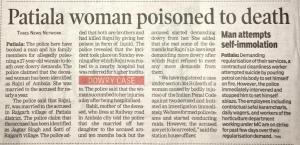It is hard to believe that to whom your life’s knots are tied become a reason for your death. But there is no surprise in the fact that people can cross any limits once their hunger for money increases. Dowry is one such prevalent issue in our society and sometimes it can result in dowry death.
As per the definition is given by the Dowry Prohibition Act, dowry means any property or valuable security given or agreed to be given either directly or indirectly:
(a) By one party to a marriage to the other party to the marriage; or
(b) By the parents of either party to a marriage or by any other person, to either party to the marriage or to any other person;
at or before or any time after the marriage in connection with the marriage of the said parties, but does not include dower or mahr in the case of persons to whom the Muslim Personal Law (Shariat) applies.
The money can be asked from the girl’s family on many occasions such as at the birth of children or at other customary and religious ceremonies. If in case, the family is unable to meet the demands, daughter has to go through a number of mental harassment or sometimes it can be worse too.
Many dowry death cases often recorded so that a boy can marry some other girl for completing their dowry needs. But to combat such issues, we have section 304B of Indian Penal Code (IPC). If the death of women happens within seven years of a marriage, it is declared as dowry death as per Section 304B under IPC.

Section 304B of the Indian Penal Code is as follows,
(1) Where the death of a woman is caused by any burns or bodily injury or occurs otherwise than under normal circumstances within seven years of her marriage and it is shown that soon before her death she was subjected to cruelty or harassment by her husband or any relative of her husband for, or in connection with, any demand for dowry, such death shall be called “dowry death”, and such husband or relative shall be deemed to have caused her death.
(2) Whoever commits dowry death shall be punished with imprisonment for a term which shall not be less than seven years but which may extend to imprisonment for life.
One of the important elements to prove it a dowry death is that the death of the bride should be related to the cruelty or harassment due to dowry demand.
These conditions should be fulfilled and the burden of proof lies on the accused to prove that he is innocent.
With an increase in a number of dowry death cases, here we came across another such case. Following are the facts of the case:
- 27 years old women named Rajni of Ambala District has been identified as being a victim of Dowry death.
- A man and his family members have been booked for poisoning Rajni. The incident took place within a year of their marriage.
- The marriage took place in Rajgarh Village of Patiala District. The names of accused are Jagtar Singh and Satti, both are brothers.
- The accused have been convicted for giving poison to the deceased in a liquid form.
- Mother of the deceased has also revealed about dowry demands after ten months of their marriage.
- Some of the dowry demands have already been met but the demand from in-laws was never-ending.
- A case has been registered under the Section 304B (death of a woman caused by bodily injuries) of the Indian Penal Code.
- The accused is still out of the reach of the police and the investigation is going on.
What are the solutions to avoid Dowry Death?
- Awareness and Education: women are needed to be literate enough to figure out the behavior of her in-laws and act accordingly.
- Strict Punishments and speedy trials:It is necessary to impart strict punishments and speedy trials for the people convicted under such crimes.
- Strengthened Implementation Mechanisms:even after having the legislation such as the Dowry Prohibition Act, the Indian Penal Code and the Protection of Women from Domestic Violence Act, the issue of dowry demand is not stopping. The enforcement of these legislations is needed to be strengthened.
This post is written by Damini Aggarwal of Punjab University (2020 batch). For more info on subject, please dial 99888-17966.